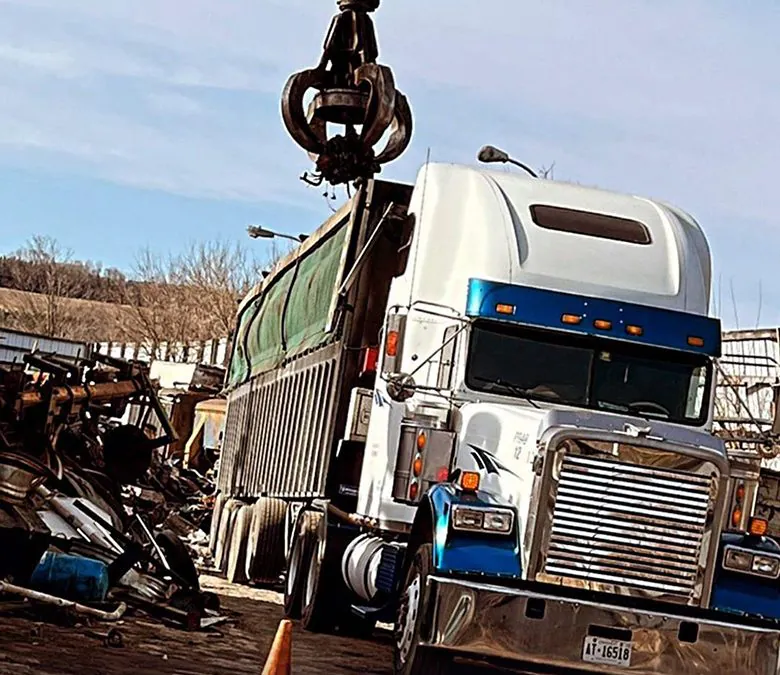Introduction
In the world of recycling and waste management, transporting scrap metal is a task that demands precision, reliability, and adherence to environmental standards. Choosing the right transportation partner for scrap metal hauling is not just about moving waste from point A to point B; it’s about ensuring that this process is handled efficiently, cost-effectively, and within the bounds of regulatory compliance. The impact of your choice extends beyond the immediate logistics; it affects your business’s bottom line, its environmental footprint, and its reputation in the industry.
Understanding Scrap Metal Hauling
Scrap metal hauling involves the collection, transportation, and recycling of metal waste. This waste can range from common household items, such as appliances and vehicles, to industrial remnants like construction beams and surplus materials. The process not only requires specialized equipment and vehicles to handle the diverse types of scrap metal but also a deep understanding of the metal’s potential hazards and value. Metals are categorized into ferrous (containing iron) and non-ferrous metals (such as aluminum, copper, and brass), each requiring different handling and transportation techniques due to their unique properties and recycling processes.
Key Factors to Consider When Choosing a Transportation Partner
Experience and Expertise
When it comes to handling and transporting scrap metal, the experience is invaluable. A partner with a long-standing presence in the industry not only brings a wealth of knowledge but also a proven track record of handling diverse challenges that come with scrap metal logistics. They should have expertise in managing the complexities of different types of metals, including both ferrous and non-ferrous materials. Look for a company that offers case studies or references that demonstrate their capability to efficiently and safely transport scrap metal for clients with similar needs to yours.
Licensing and Compliance
The transportation of scrap metal is heavily regulated to ensure environmental protection and public safety. A reputable transportation partner will have all the necessary licenses and certifications required for hauling scrap metal. This includes compliance with local, state, and federal regulations regarding the transportation of hazardous materials, should your scrap metal be classified as such. Ask potential partners about their compliance strategies and how they stay updated with changing regulations to ensure your scrap metal is transported legally and safely.
Equipment and Capability
The right equipment is crucial for the efficient and safe transportation of scrap metal. Your transportation partner should have access to a fleet of vehicles and equipment that can accommodate the specific types of scrap metal you need to haul, including heavy machinery for loading and unloading large or heavy pieces. Additionally, the condition and maintenance of their equipment are vital for preventing delays or accidents during transportation. Inquire about their fleet’s capabilities and how they ensure their equipment is kept in optimal condition.
Safety Records and Practices
Safety is paramount in the transportation of scrap metal, given the potential risks involved in hauling heavy and sometimes hazardous materials. A trustworthy transportation partner will prioritize safety above all, demonstrated by a clean safety record and strict adherence to safety protocols. This includes regular training for their staff on the latest safety practices and emergency response procedures. Investigating a company’s safety record and their commitment to maintaining a safe working environment is essential for minimizing risk during the transportation process.
The Role of Technology in Scrap Metal Hauling
Advancements in technology have significantly improved the efficiency and security of scrap metal transportation. Look for a transportation partner that utilizes technology for route optimization, real-time tracking, and secure communication. These technologies not only enhance the efficiency of the transportation process but also provide you with transparency and peace of mind by allowing you to monitor the status of your scrap metal throughout its journey.
Evaluating Cost-Effectiveness
While cost should not be the sole factor in choosing a transportation partner, it is undoubtedly an important consideration. It’s essential to evaluate the cost-effectiveness of a transportation partner by considering their pricing in relation to the quality and range of services they offer. A partner that may seem more expensive upfront might offer greater value through enhanced safety measures, superior technology, or more efficient service that can save you money in the long run.
Questions to Ask Potential Transportation Partners
Before making your final decision, prepare a list of questions to better understand the capabilities and reliability of potential transportation partners. These questions can cover areas such as their experience with similar projects, their approach to safety and compliance, the technology they use, and how they calculate their pricing.
Conclusion
Choosing the right transportation partner for scrap metal hauling is a decision that requires careful consideration of several key factors. From their experience and expertise to their compliance with regulations, equipment, safety practices, and the use of technology, each aspect plays a crucial role in ensuring the safe, efficient, and cost-effective transportation of your scrap metal. By taking the time to thoroughly vet potential partners and asking the right questions, you can form a partnership that not only meets your current needs but also supports your business’s growth and success in the long term.
This comprehensive guide aims to arm you with the knowledge and tools needed to make an informed decision when selecting a transportation partner for your scrap metal hauling needs. Remember, the right partner is not just a service provider but a valuable ally in your business’s operational efficiency and sustainability efforts.

